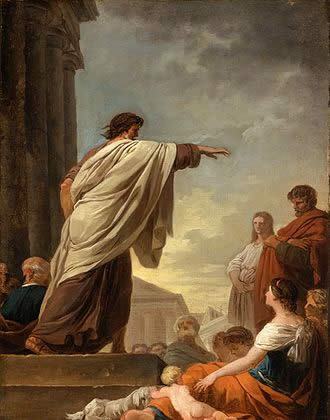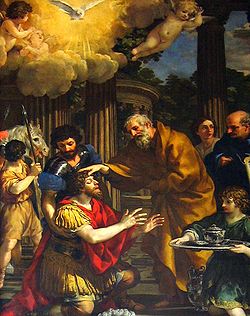Now get up and go and you will be told what you must do
 The Predication of Saint Paul, in Los Angeles County Museum of Art
The Predication of Saint Paul, in Los Angeles County Museum of Art
Paul the Apostle, also called the Paul of Tarsus, and Saint Paul, was a zealous Jew, who persecuted the early followers of Jesus Christ. However after his "Resurrection experience", he became a Christian and referred to himself as the "Apostle to the Gentiles". Of all the founders of the Church, Paul was perhaps the most brilliant and many-sided, the broadest in outlook, and therefore the best endowed to carry Christianity to alien lands and peoples.
Born into a well-to-do Jewish family of Tarsus, the son of a Roman citizen, Saul (as we shall call him until after his conversion) was sent to Jerusalem to be trained in the famous rabbinical school headed by Gamaliel. Here, in addition to studying the Law and the Prophets, he learned a trade, as was the custom. Young Saul chose the trade of tent-making.
In the year 35 AD, Saul appears as a self-righteous young Pharisee, almost fanatically anti-Christian. He believed that the trouble-making new sect should be stamped out, its adherents punished. He was present, although not a participator in the stoning, when Stephen, the first martyr, met his death.
Transformation of Saul (St. Paul)
Paul experienced the revelation which was to transform his life. On the road to the Syrian city of Damascus, where he was going to continue his persecutions against the Christians, he was struck blind. As he neared Damascus on his journey, suddenly a light from heaven flashed around him. He fell to the ground and heard a voice say to him, "Saul, Saul, why do you persecute me?". "Who are you, Lord?" Saul asked. "I am Jesus, whom you are persecuting," he replied. "Now get up and go into the city, and you will be told what you must do."
 Ananias restores the sight of Saint Paul. A 1631 painting by Pietro Cortona.
Ananias restores the sight of Saint Paul. A 1631 painting by Pietro Cortona.
On arriving in Damascus, there followed in dramatic sequence his sudden conversion, the cure of his blindness by the disciple Ananias, and his baptism. Paul accepted eagerly the commission to preach the Gospel of Christ, but like many another called to a great task he felt his unworthiness and withdrew from the world to spend three years in "Arabia" in meditation and prayer before beginning his apostolate.
The Judaic, Roman, and Greek traditions and cultures all had a part in shaping this great Apostle, who was so different in status and temperament from the humble fishermen of Jesus' initial band of disciples. His missionary journeys were to give him the flexibility and the deep sympathy that made him the ideal human instrument for preaching Christ's Gospel of world brotherhood.